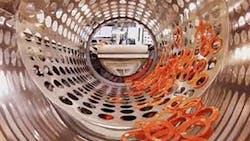Need Help Manufacturing in Washington State?
Public and private collaboration between state economic development, workforce development, manufacturing experts and higher education institutions, resulted in the creation of ‘Make it in Washington.’
Small and midsized manufacturers in qualified Washington counties will have access to a new blend of support to strengthen their businesses—ranging from strategic business consulting services and operational technical assistance to funded training opportunities for employees.
The Make it in Washington grant was one of 10 awards made nationwide as part of the U.S. Economic Development Administration-funded Make it in America Challenge, created to further the Obama Administration’s efforts to protect and create American manufacturing jobs. Make it in Washington is a three-year initiative that will deliver services through 2016.
“By exploring expansion opportunities linked with re-shoring and identifying domestic suppliers, Washington’s small and medium-sized manufacturing companies can increase their profitability and competitiveness in the global economy,” said Kim Zentz, CEO of Innovate Washington Foundation. “The collective strengths of the Make it in Washington grant partners allow us to help companies get what they need to capitalize on these opportunities—and create jobs in Washington.”
The Make it in Washington partnership includes:
Innovate Washington Foundation – The Innovate Washington Foundation is a statewide, public-private partnership that is a catalyst for economic growth in Washington’s innovation economy. The organization collaborates, convenes and connects innovators and researchers with the entrepreneurial and financial capital needed to produce the world-class companies and high-value jobs that will form the backbone of our region’s future economy.
Washington Department of Commerce, Business Services Division – To assist companies in doing business with and in Washington, the Department of Commerce offers a wide range of business services to streamline the site selection process, encourage global investment, engage in international trade, and promote economic growth statewide in specific key sectors including advanced manufacturing, aerospace, clean technology, information and communication technology (ICT), life sciences, maritime, and military and defense.
Washington State University, Engineering and Technology Management (ETM) Program – Washington State University’s ETM Program is designed for working professionals who want to develop skills to manage projects, technology, and people. The program prepares engineering and business professionals to make strategic and operational decisions and become leaders in the management of technology. The ETM Program is specifically tailored for professionals who want to advance their careers while still working fulltime.
University of Washington Applied Physics Laboratory (APL-UW) – Over its seventy-year history, the University of Washington Applied Physics Laboratory has become renowned as a highly respected center of excellence in cutting-edge research and development that integrates across the spectrum of basic research to applied science and engineering. APL-UW serves as a trusted leader assisting national R&D decision makers while contributing to solving some of the most complex and time-critical problems challenging our nation and the state of Washington.
Impact Washington – Impact Washington is a non-profit organization that strengthens Washington manufacturers to make them more globally-competitive. Impact Washington’s manufacturing experts and network of industry resources provide the change that makes the difference between surviving and thriving.
Workforce Training & Education Coordinating Board – The Workforce Training & Education Coordinating Board is a partnership of labor, business and government dedicated to helping Washington State residents obtain and succeed in family-wage jobs, while meeting employers’ needs for skilled workers. As a state agency, the Workforce Board oversees a workforce development system that includes 18 education and training programs receiving almost $1 billion annually in state and federal funds.
The Center of Excellence for Global Trade & Supply Chain Management at Highline College – As a public institution of higher education serving a diverse community in a multicultural world and global economy, Highline College promotes student engagement, learning, and achievement; integrates diversity and globalism throughout the college; sustains relationships within its communities; and practices sustainability in human resources, operations, and teaching and learning. Established in March 2007, the Center of Excellence for Global Trade & Supply Chain Management is guided by industry representatives to lead collaborative and coordinated statewide education and training efforts to build a competitive workforce in a global economy.
Shoreline Community College – Founded in 1964 with land acquired with help from the Boeing family, Shoreline Community College offers more than a hundred excellent academic, professional/technical and workforce training programs to meet the lifelong learning needs of its community. Dedicated faculty and staff are committed to the educational success of all students.
